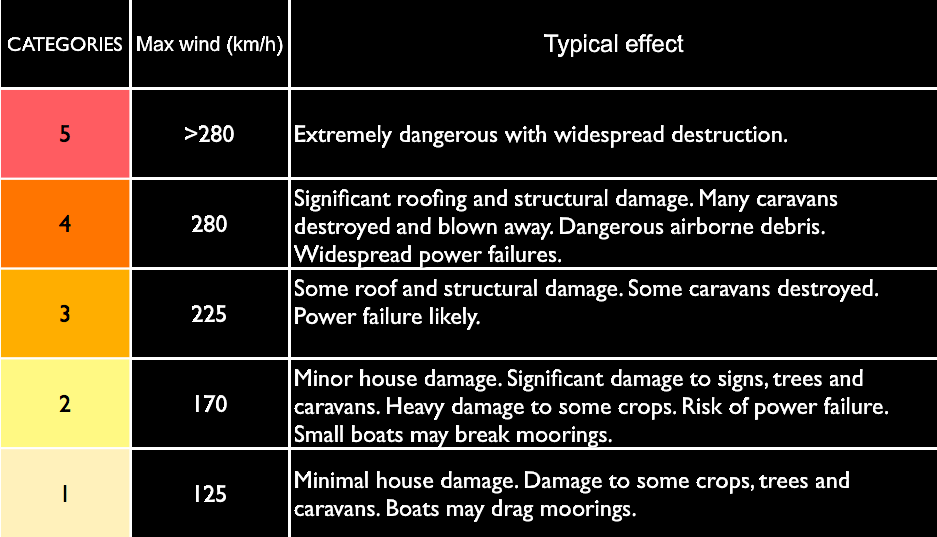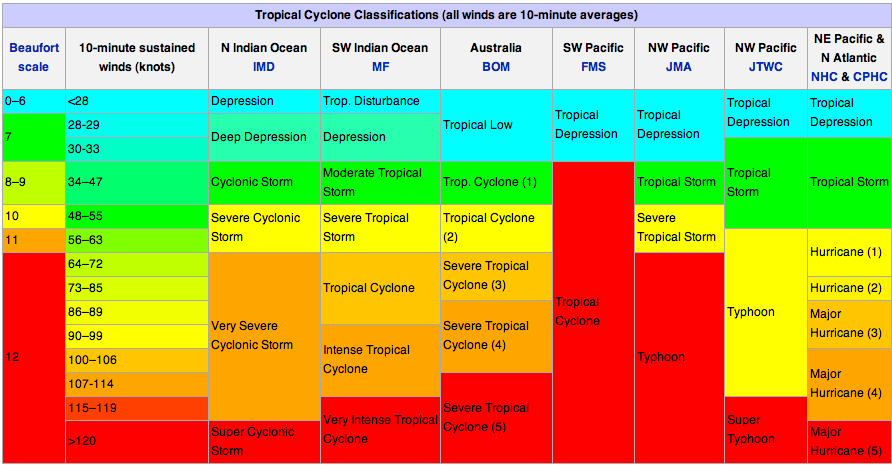Cyclone Larry - Category 5
Cyclone Larry - Category 5
see also Tropical Cyclones (sepatate
file)
see
also Cyclone Larry Analysis (separate file)
see also Origins of Extreme Weather
(separate file)
to images - click on image for full size version
Before Cyclone
After Cyclone
how the cyclone has affected Earth Science Australia
Australian Cyclone Classification 1 to 5
World Cyclone Classification by Region
The small bananna and sugar cane producing town of Innisfail in Far North Queensland Austalia was struck by a Category 5 cyclone named "Larry" at 6:00 am Monday March 20, 2006. 4000 people are homeless out of a local population of about 25,000.
Earth Science Australia was there and provides these exclusive photos for educational use.
They do not show the worst damage but were snapped in the processs of recovering keepsakes from our residence.
Category 5 is the most destructive category with highly destructive winds reaching 280kmh. Gusts to 230kmh were registered in town before the wind measuring devices were blown away.
Explosive convection on the northern wall of the eye just as the cyclone hit the coast probably saved Innisfail from the full force of the wind. Damage along the northern wall appears, according to local residents was patchy and looked more like tornado tracks. On the other hand the southern wall remained intact and Silkwood , to the south of Innisfail suffered 90% housing destruction.
Miraculously there were no casualties.
There was extensive damage to infastructure. Improved building codes meant that some houses were left standing but most suffered roof loss or damage compounded by 150mm rain on March 21 and 230mm rain on March 22.
The electricity system was badly damaged by winds and flying debris almost none of the electricty system is buried despite recommendations that key circuits, such as the hospital and Central Business District, be buried. As the pumps for water pumping and chlorination and the pumps for sewage are electric without back up diesel generators, serious health risks needlessly result.
The damage is easy to see but there are many long term affects not so obvious.
- all the banana plants were flattened new bananas will need to sprout and fruit - so banana farmers will have no income for 8-10 months, all banana workers will be almost immediately unemployed
- pawpaw (papaya) growers are in a similar situation- new trees will need to be planted - no income and no work for 6-8 months
- sugar cane growers were enjoying their first good prices in several years - much of the crop is too flattened to harvest starting in June
- dairy farmers with no electricity are unable to milk their cows - the cows will stop lactating and production will not resume for about 12 months - no income - no work
- fruit and nut growers have a very long time line of recovery, for
example a macadamia nut grower may need seven years of
tree growth to get their first crop
Images - click on any image for a larger size...
Before Cyclone Larry Category 5

getting the vehicle under cover

protection from flying debris

waterproofing and stacking furnishing against interior walls, using inverted bookshelf to reinforce interior hallway door to create a "safety zone"

nature refuge research facility 35km from coast , 210m into dense rainforest
After Cyclone Larry Category 5

20m high fig tree lifted out by roots and carried 10m

flattened banana trees will take 8-10 months to regrow fruit

remains of King George park in Innisfail formerly lush rainforest

Innisfail Hotel "lattice work" is the remains of the floor of the next floor up

roofs of various local businesses block the central business district

remains of rainforest, formerly too dense to see through

this is our front yard - we have no trees there, these have blown in, we removed 51/2 tonnes of vegetation from our normal size lot

a view to the side of our house, formerly rainforest, the house behind is missing most of its roof

a view to the back of our house, a landscape unfamiliar to us

our view now unrecognisable

diagonally across street, what 230kmh does to a power pole and our roofless neighbour's house, roof in foreground does not come from nearby it has traveled in the air at least 200m!

our house - miraculous luck!

our immediate concerns - mosquito outbreaks and dengue fever, contaminated drinking water (must be boiled minimum 1 minute), electricity (estimate if lucky in 2-3 weeks)

eye of Cyclone Larry passed over the rainforest research centre

damage to Innisfail State High School top floor removed
How Category 5 Cyclone Larry affected Earth Science Australia
- no worries!
- as always we remain on-line in 2006 celebrating a decade on the web
and over 1 million student visitors per year
- our equipment is wasted - our 1998 Alpha computer is dead, scanner
is gone, modem, printer all scrap
- we exist on a borrowed laptop and a flash drive
- updating the site requires a 170km round trip drive to a functional computer
- we hope to have mains power back on in three weeks
- to their shame, we get no on-going mining, industry, educational or
government support of the earth sciences in Australian schools
- The site accesses between 400 and 500 students for every $1.00 AUD sponsorship
- donations of equipment, connection time gratefully accepted (we have never been able to afford to incorporated as a "not-for-profit organisation" so no tax advantage for you - sorry) via P.O. Box 1875, Innisfail, Queensland , Australia 4860
- (note 2017 - no assistance was received)
Australian Cyclone Classification 1 to 5

World Cyclone Classification by Region


